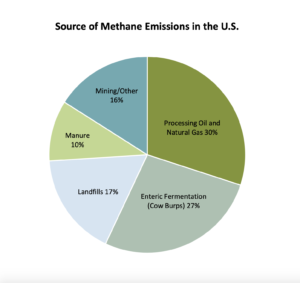At the 2021 COP26 summit, many world leaders, including President Biden, pledged to reduce global methane emissions by at least 30% below 2020 levels by 2030. In response to the pledge, the Biden Administration released a comprehensive plan for reducing U.S. methane emissions across multiple sectors, including oil and gas production and pipelines, landfills, and agriculture.
Methane is nearly 80 times more potent than carbon dioxide and is responsible for 30% of global warming. In the U.S., the two most significant sources of methane emissions are the drilling, flaring, and transporting of oil and natural gas and the decomposition of biological material in dairies, landfills, and wastewater treatment plants.

Idaho contributes to the methane problem in two ways.
First, Idaho’s dairies produce large amounts of methane through enteric fermentation (cow burps) and manure. These agricultural methane emissions are difficult to regulate at both the state and federal levels. Thus, efforts to curb our methane emissions should focus on improving manure management practices and implementing new technologies that reduce enteric fermentation emissions. Dairy digesters are one promising solution because they capture methane emitted from manure and convert it to biogas which can displace fossil-sourced methane. ICL staff recently toured Digester Doc, a Boise-based company dedicated to expanding the use of digesters in Idaho agriculture and addressing the growing market for biogas in the Boise area. In addition, Shell Oil recently announced plans to construct a facility in southern Idaho that will convert manure-based methane emissions from a nearby dairy into renewable natural gas that can be used for fuel.
Second, Idahoans contribute to methane emissions by heating our homes and businesses and cooking on gas stoves. Because methane is released during the production and transportation of natural gas, natural gas powered furnaces and stoves play a significant role in increasing methane emissions. In addition, gas stoves may contribute to adverse health effects for users.
National and international decision makers are making progress in regulating this dangerous greenhouse gas. It is time that we take action at the local level by encouraging our lawmakers to incentivize methane digesters and other methane-reducing technologies. In addition to local engagement, there are everyday actions you can take to help solve the dairy methane problem, including reducing your dairy and meat consumption and eliminating food waste. To reduce home sources of methane, you can lower your home heat and clean your furnace filter regularly. Instead of a gas stove, use an electric pressure cooker or switch to an electric stove. If it is time to replace your furnace, consider switching to an electric heat pump.
For more information and to learn how to get involved, contact: ICL’s Climate Fellow, Emma Sperry.
